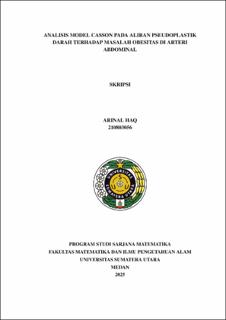Analisis Model Casson pada Aliran Pseudoplastik Darah terhadap Masalah Obesitas di Arteri Abdominal
Analysis of the Casson Model in Pseudoplastic Blood Flow Related to Obesity in the Abdominal Artery
Abstract
Blood flow in arterial vessels exhibits complex non-Newtonian behavior, especially
under pathological conditions such as obesity. Obesity is a major risk factor for the
development of cardiovascular diseases, as it contributes to the accumulation of fat
in the arterial walls, ultimately leading to the narrowing (stenosis) of blood vessels.
In this study, the Casson model is employed to analyze pseudoplastic blood flow in the
abdominal artery with varying degrees of stenosis at 25%, 50%, 75%, and 90%. Simulations were conducted using COMSOL Multiphysics software to evaluate the velocity
distribution and flow patterns resulting from narrowing caused by fat accumulation. The
simulation results indicate that higher degrees of stenosis lead to increased maximum
blood flow velocity in the stenotic region. This occurs due to elevated pressure and flow
acceleration resulting from the reduced arterial cross-sectional area. Furthermore,
downstream of the stenosis, the blood flow pattern changes significantly, with the
potential formation of recirculation zones, which may contribute to an increased risk of
cardiovascular complications in individuals with obesity. This study provides valuable
insights into the effects of obesity-induced stenosis on blood flow dynamics and demonstrates that the Casson model is a suitable approach for understanding such phenomena
Collections
- Undergraduate Theses [1496]

